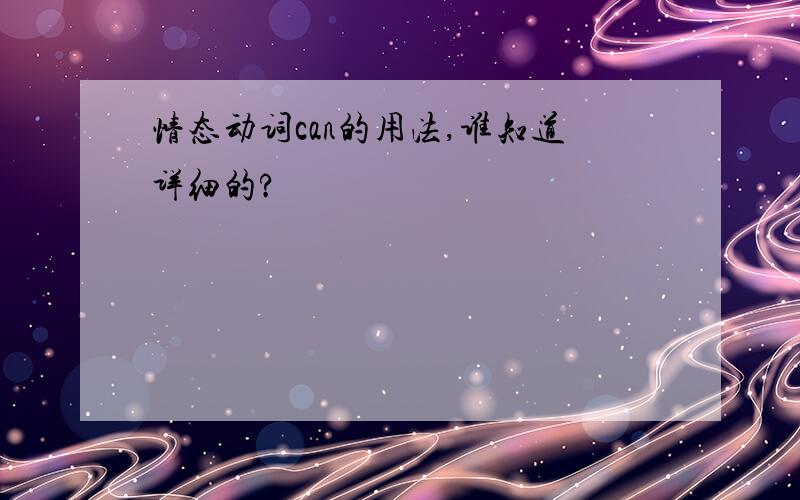情态动词can的用法,谁知道详细的?
来源:学生作业帮助网 编辑:作业帮 时间:2024/08/08 13:17:50

情态动词can的用法,谁知道详细的?
情态动词can的用法,谁知道详细的?
情态动词can的用法,谁知道详细的?
一、 基本用法
1.表示能力(如体力和脑力方面),意为“能;会”等.例如:
Can you speak English?你会讲英语吗?
Can you play the piano?你会弹钢琴吗?
2.表示请求或允许,多用在口语中,意为“可以;能”等.用于疑问句中用来提出要求,用于否定句表示不允许.例如:
Can I help you?You can’t play basketball.你不能玩篮球.
Can you...“请你……好吗?”表示说话人的请求;Can I...“我可以……吗?”用来征求对方是否允许自己做某事.如在句末加上
please一词就显得更有礼貌了.例如:
Can you help me,please?请你帮助我好吗?
3.表示可能.例如:
He can be at home now.他现在可能在家.
The moon can’t always be full.月亮不可能常圆.
4.表示怀疑.在表达此意时,只能用于一般疑问句中,带有感情色彩.例如:
Can it be true?那会是真的吗?
二、 句式变化如下:
1.在变否定句时,直接在can后加上“not”,可缩写成can’t或cannot,但不能写成cann’t.例如:
He can swim.→ He can’t swim.
Emma can see the pen on the desk.→ Emma cannot see the pen on the desk.
2.在变一般疑问句时,直接移到主语前(原主语的首字母改成小写,第一人称应变为第二人称)即可.例如:
I can see an orange on the table.→ Can you see an orange on the table?
其回答可用Yes,OK或Certainly等作肯定回答;用No或Sorry等作否定回答.例如:
—Can you look after my books,please?你能照看一下我的书吗?
—OK.可以.
用Certainly回答.此时语气更为肯定.例如:
—Can I see your guitar?我能看看你的吉它吗?
—Certainly.当然可以.
[特别提醒] can与may都可以表示“许可”.在征求对方意见时用may较多.例如:May I go now?现在我可以走吗?在询问客观上是否可以时,can则当仁不让.例如:Can we take the books out?我们能把这些书拿出去吗?在两者都可以用时,may显得客气一些.例如:May I take this seat?比Can I take this seat?稍婉转一点.在陈述句中用我较多.例如:You can sit here.你可以坐在这里.
can还可以表示能力,而may则无此用法.
都是情态动词。情态动词本身有一定的意义,可以表示说话人的语气和态度或说话一、情态动词 can 的用法 1. 表示能力,意为“能、会”。如: —— Can
主语+can+do+其他~
在表达“某人能做某事”时,可以用“can+动词原形”表达。
Can
1) 表示能力(体力、知识、技能)。
Can you lift this heavy box?(体力)
Mary can speak three languages.(知识)
Can you skate?(技能)
此时可用be able to代替。Can只有一般现在时和一般过去式;而be able to则有更多的时态。
I’ll n...
全部展开
Can
1) 表示能力(体力、知识、技能)。
Can you lift this heavy box?(体力)
Mary can speak three languages.(知识)
Can you skate?(技能)
此时可用be able to代替。Can只有一般现在时和一般过去式;而be able to则有更多的时态。
I’ll not be able to come this afternoon.
当表示“经过努力才得以做成功某事”时应用be able to,不能用Can。如:
He was able to go to the party yesterday evening in spite of the heavy rain.
2) 表示请求和允许。
-----Can I go now?
----- Yes, you can. / No, you can’t.
收起
①表示能力 “能,会”
eg: He can speak a little Japanese.
②表示请求或许可 “可以”,用于各种人称
eg: Can I help you?
③在肯定句表理论的推测,不涉及某事是否会发生 ,关键词sometimes
e.g. It is usually warm in my hometown in ...
全部展开
①表示能力 “能,会”
eg: He can speak a little Japanese.
②表示请求或许可 “可以”,用于各种人称
eg: Can I help you?
③在肯定句表理论的推测,不涉及某事是否会发生 ,关键词sometimes
e.g. It is usually warm in my hometown in March, but it can be rather cold sometimes.
收起
参考资料::http://www.edudown.net/student/English/fudao/200607/8587.html